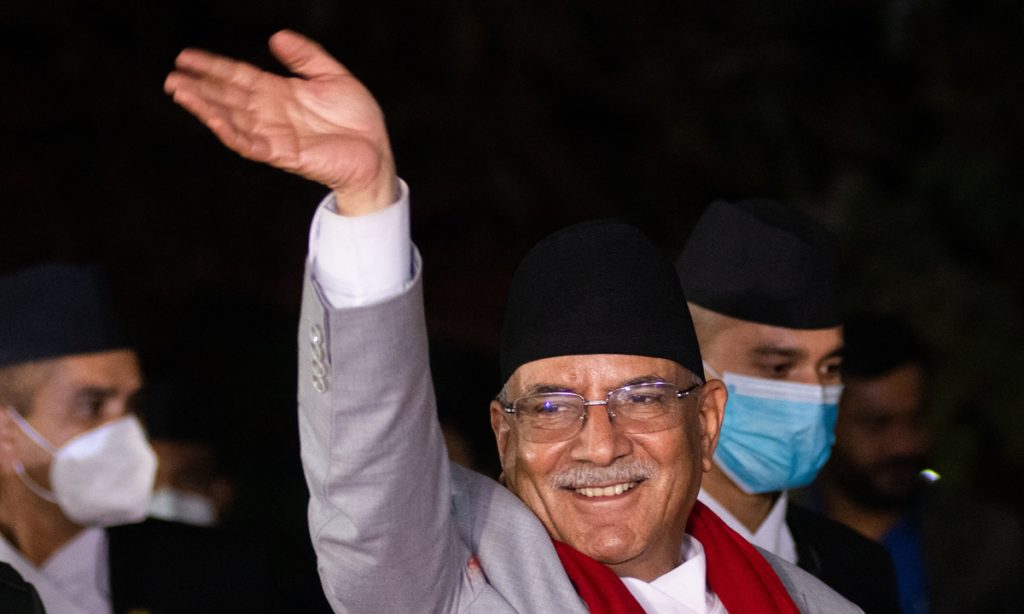Prachanda’s China visit highly anticipated as Nepal seeks ties of equi-proximity with both China, India

Nepali Prime Minister Pushpa Kamal Dahal will be on an official visit to China from September 23 to 30, during which he will attend the opening ceremony of the 19th Asian Games in Hangzhou, and meet President Xi Jinping as well as several other leaders. Dahal believes the visit will strengthen and deepen the traditional friendly relations between China and Nepal. Another aim of the visit is to seek further avenues of bilateral cooperation.
On September 7, the first batch of imported goods under the China-Nepal Transit Transport Agreement, consisting of 15 tons of turmeric powder, arrived in the Nepali capital of Kathmandu after transiting through China. The turmeric powder was imported by Nepal from Vietnam and transported to Kathmandu via Tianjin Port in northern China and the Zhangmu-Tatopani border point. Both China and Nepal have positively commented on this achievement. The Nepali side stated that the successful transportation of the first batch of goods under the China-Nepal Transit Transport Agreement signifies the beginning of a transformative journey toward enhanced economic cooperation, increased trade volumes and shared prosperity. Chinese Ambassador to Nepal Chen Song noted that the successful implementation of the China-Nepal Transit Transport Agreement will diversify Nepal's international trade and facilitate Nepal's trade with the whole world. In the future, the time and cost of importing and exporting goods via China will be further reduced, which will have a positive impact on Nepal's trade.
In contrast to the substantial progress made by China and Nepal in areas such as cross-border transportation, Nepal has been facing ongoing issues with another neighboring country, India, recently. In May, the Nepali government was infuriated by a mural displayed within the newly inaugurated Indian Parliament building. This mural, titled "Akhand Bharat," included the Chinese Tibet region, parts of Afghanistan, as well as the entire territories of Nepal, Pakistan, Bangladesh, Sri Lanka and Myanmar. As early as May 2020, India inaugurated a road connecting the Indian mainland to the border region, passing through the disputed territory of Kalapani, which is claimed by Nepal.
In fact, the incidents of the mural and road inauguration reflect the ongoing contestation and counter-control between Nepal and India, which has been a longstanding feature of their relationship. For a long time, India has adopted a paternalistic approach in its policies toward Nepal. While providing some support and assistance, India often resorts to rude and unilateral actions toward Nepal.
Nepal is located north of the Himalayas and is surrounded by Indian territory in the west, south and east. It heavily relies on India for economic and external communication, including the transit of essential goods such as food, medicine and fuel through India. India is Nepal's largest trading partner. In addition to the geographical dependence on India for external connectivity, Nepal is also deeply influenced, and even controlled, by India in political, social and security domains.
However, this has become a bargaining chip for India's attempt to control Nepal. In history, India has repeatedly used the agreement on transit through Nepal as a coercive diplomatic tool, threatening and implementing blockades against Nepal to force the Nepali authorities to adopt domestic and foreign policies that align with India's wishes. This has caused serious dissatisfaction among various levels of Nepali society and the government. Nepal has also actively sought alternative transportation routes to reduce its dependence on India. In 2017, Nepal officially joined the Belt and Road Initiative, which was a clear indication to India that Nepal is a country with the right to make independent choices.
Objective conditions determine that Nepal will continue to rely to varying degrees on the transit routes provided by India in the past, present and future, which means that Nepal cannot completely sever ties with India. In this situation, how to handle relations with India without compromising national sovereignty, independence and territorial integrity while ensuring smooth communication between Nepal and the outside world has always been the greatest challenge for Nepal's foreign policy. It is precisely because of this, after Prachanda assumed the position of Prime Minister for the third time, he made his first visit to India.
In contrast, China strictly adheres to the Five Principles of Peaceful Coexistence and never interferes in Nepal's internal affairs. All factions in Nepal actively seek development and close relations with China. After assuming the position of Deputy Prime Minister, Narayan Kaji Shrestha stated that the country will "maintain relationships of equi-proximity with both our neighbors," namely China and India, emphasizing that the focus of governance will be on "containing inflation, maintaining reserves, raising capital expenses, narrowing the trade deficit and lowering interest rates" to promote Nepal's economic development. The results of Prachanda's visit are highly anticipated.